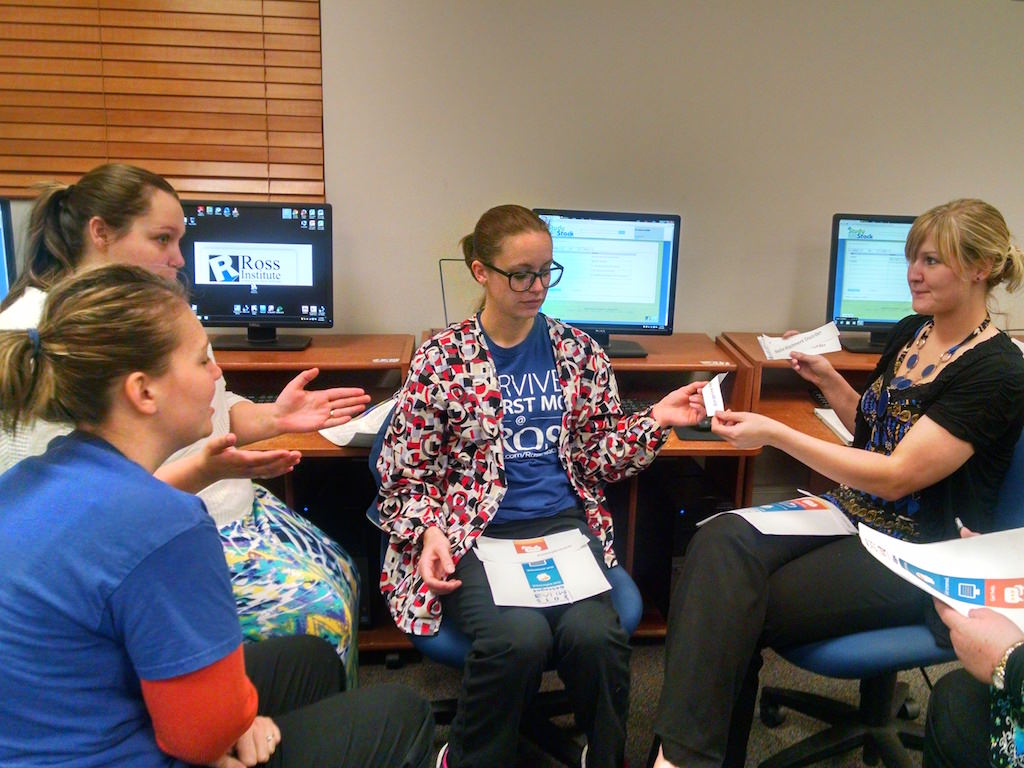 One of the main themes of the Ross Medical Education Center campus in Roosevelt Park this May was “B4Stage4” as they engaged in educational activities to recognize May as Mental Health month. B4Stage4 is a campaign organized by Mental Health America and is about recognizing mental health issues and encouraging early detection. Their goal is to intervene and help before the mental illness gets to a stage 4 which can be debilitating. “It is important that as a medical professional we are able to identify as well as empathize with those with a mental health issue,” said Campus Director Lisa Picard. “It is easy to see a person with a physical disability and have the ability to have empathy but with mental health you cannot look at someone and know. This is why this is such a huge focus this month to give the students a better understanding as to what mental health consists of and resources to utilize either now or in the future.”
One of the main themes of the Ross Medical Education Center campus in Roosevelt Park this May was “B4Stage4” as they engaged in educational activities to recognize May as Mental Health month. B4Stage4 is a campaign organized by Mental Health America and is about recognizing mental health issues and encouraging early detection. Their goal is to intervene and help before the mental illness gets to a stage 4 which can be debilitating. “It is important that as a medical professional we are able to identify as well as empathize with those with a mental health issue,” said Campus Director Lisa Picard. “It is easy to see a person with a physical disability and have the ability to have empathy but with mental health you cannot look at someone and know. This is why this is such a huge focus this month to give the students a better understanding as to what mental health consists of and resources to utilize either now or in the future.”
There were three major activities that took place on the campus throughout the month. The first activity consisted of giving the students slips of paper with written mental health diagnoses. The students were asked to define “well” and “unwell” by their own definition then take the diagnosis in which were presented and put them into categories based on what they think. After the groups completed, it was a great experience to really talk about the fact that no matter what the diagnosis is, with treatment everyone can be well even if they have a diagnosis such as schizophrenia. It was really eye opening for some of the students as everyone started sharing about personal experiences.
 The second activity was a lecture prepared by Dr. Zia Khan, a local psychiatrist and the Medical Director for West Michigan Community Mental Health. Dr. Khan is originally from Pakistan and has 29 years of experience in the field. He has worked at several organizations over the years and developed much experience with those suffering from mental illness. Dr. Khan engaged the evening students in the scientific explanation of mental health disorders. He broke it down to the cellular level and then explained how the brain is affected and how various disorders operate in the brain. The students were engaged and asking questions; everyone at the campus really enjoyed the lecture.
The second activity was a lecture prepared by Dr. Zia Khan, a local psychiatrist and the Medical Director for West Michigan Community Mental Health. Dr. Khan is originally from Pakistan and has 29 years of experience in the field. He has worked at several organizations over the years and developed much experience with those suffering from mental illness. Dr. Khan engaged the evening students in the scientific explanation of mental health disorders. He broke it down to the cellular level and then explained how the brain is affected and how various disorders operate in the brain. The students were engaged and asking questions; everyone at the campus really enjoyed the lecture.
The final activity was giving resources to the students. The Campus Director and Assistant Campus Director of Education went into the classroom and shared where to get help if you believe you are suffering from mental illness. They also explained the screening processes and provided local resources to the students at the campus. Statistics were shared to give the students a better understanding of the progression of these disorders with a goal of getting help B4Stage4. Everyone was very grateful for all of the new information.
